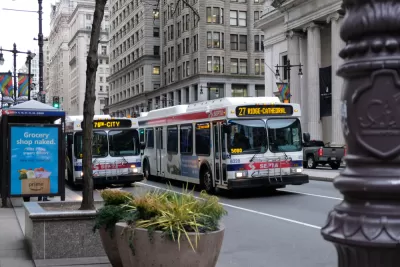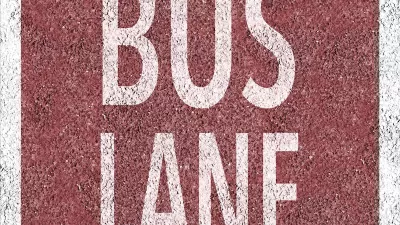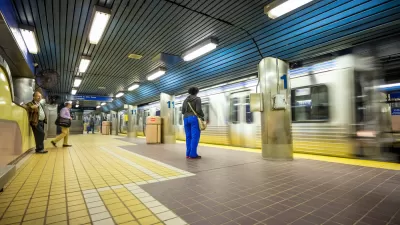A pilot program revealed roughly 4,000 instances of vehicles blocking bus lanes or bus stops every week.

Since late April, the Southeastern Pennsylvania Transportation Authority (SEPTA) has been monitoring bus lanes and bus stops on two routes via bus-mounted cameras, documenting 4,000 average violations per week, according to an article by Thomas Fitzgerald in The Philadelphia Inquirer.
The agency did not issue any citations, but used the experiment as an opportunity to study the impact of bus lane blockages on transit speed and reliability. “Buses navigating Philadelphia traffic average a speed of 8 mph, SEPTA says, slower than the national average of about 14 mph. Every year, congestion in Center City causes 1.7 million hours of passenger delays and adds $15.4 million to the transit agency’s operating costs, according to a 2019 Econsult Solutions study commissioned by SEPTA.”
The agency will weigh whether to create an enforcement program for bus lane violations, which has shown positive results in New York. As Fitzgerald explains, after beginning to enforce bus lane blocking violations, New York’s MTA reported “big increases in travel speed on some routes and a 30% drop in bus crashes on one major route because operators don’t have to swing into the traffic lane to avoid obstacles as often.”
FULL STORY: SEPTA found more than 20,000 violations in a study on blocking bus-only lanes and bus stops

Maui's Vacation Rental Debate Turns Ugly
Verbal attacks, misinformation campaigns and fistfights plague a high-stakes debate to convert thousands of vacation rentals into long-term housing.

Planetizen Federal Action Tracker
A weekly monitor of how Trump’s orders and actions are impacting planners and planning in America.

In Urban Planning, AI Prompting Could be the New Design Thinking
Creativity has long been key to great urban design. What if we see AI as our new creative partner?

King County Supportive Housing Program Offers Hope for Unhoused Residents
The county is taking a ‘Housing First’ approach that prioritizes getting people into housing, then offering wraparound supportive services.

Researchers Use AI to Get Clearer Picture of US Housing
Analysts are using artificial intelligence to supercharge their research by allowing them to comb through data faster. Though these AI tools can be error prone, they save time and housing researchers are optimistic about the future.

Making Shared Micromobility More Inclusive
Cities and shared mobility system operators can do more to include people with disabilities in planning and operations, per a new report.
Urban Design for Planners 1: Software Tools
This six-course series explores essential urban design concepts using open source software and equips planners with the tools they need to participate fully in the urban design process.
Planning for Universal Design
Learn the tools for implementing Universal Design in planning regulations.
planning NEXT
Appalachian Highlands Housing Partners
Gallatin County Department of Planning & Community Development
Mpact (founded as Rail~Volution)
City of Camden Redevelopment Agency
City of Astoria
City of Portland
City of Laramie




























